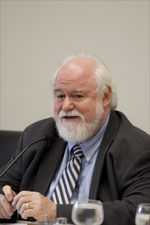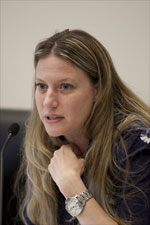Africa's Future: Meeting the Infrastructure Challenge
Developing Africa’s transportation, irrigation, communication, electric, and financial services infrastructure is key to unlocking Africa’s potential. Experts provided the most recent comprehensive assessment of Africa’s current and future infrastructure needs and the innovative strategy for developing regional corridors to facilitate trade and economic growth across Africa.
Overview
 Improving Africa's infrastructure is vital to reducing poverty and addressing food security, and to ultimately unblocking Africa's potential in the decades to come. On June 15, 2010, Wilson Center on the Hill and the Wilson Center's Africa Program sponsored a briefing that began with a comprehensive assessment of Africa's infrastructure and examined a development approach based around economic corridors of development – an approach originated by Nelson Mandela that has strong support from the African Union and many African countries. As Moderator Steve McDonald, the Director of the Africa Program, stressed, "Whatever your agenda [in Africa], the issue of infrastructure is absolutely key to it all."
Improving Africa's infrastructure is vital to reducing poverty and addressing food security, and to ultimately unblocking Africa's potential in the decades to come. On June 15, 2010, Wilson Center on the Hill and the Wilson Center's Africa Program sponsored a briefing that began with a comprehensive assessment of Africa's infrastructure and examined a development approach based around economic corridors of development – an approach originated by Nelson Mandela that has strong support from the African Union and many African countries. As Moderator Steve McDonald, the Director of the Africa Program, stressed, "Whatever your agenda [in Africa], the issue of infrastructure is absolutely key to it all."
Vivien Foster, the Lead Economist for the Africa Program of the Office of the Director for Sustainable Development at the World Bank, provided an overview of the findings of the "Africa Infrastructure Country Diagnostic," a major study undertaken by the World Band and twelve multilateral organizations that examined the current state of Africa's infrastructure and its future needs. The study assessed the status of roads, rail and other transportation services, drinking water and irrigation systems, telecommunications, electric power and other key infrastructure systems. The diagnostic found that infrastructure is critical to Africa's growth but has been hampered by very limited stocks of infrastructure and cost. Most African countries offer limited services at high costs, which reflects the restricted markets created by Africa's complicated economic geography. For example, Africa is characterized by landlocked countries with small populations and smaller economies. This means that regional collaboration is needed in order to institute effective infrastructure.
The infrastructure challenges and barriers that Africa must face are significant by any measure. Railways are virtually nonexistent in several African countries; thirty countries face persistent energy blackouts; existing roads are hampered by their poor quality and numerous road blocks and check points; and less than 5 percent of agricultural land is irrigated. Foster's analysis estimates that transforming Africa's infrastructure would require an additional $31 billion per year as well as tremendous efficiency gains. Moreover, while private sector investment and public-private partnerships are important, government expenditure is crucial. For example, power and water utilities, railways, and roads all require public buy-in.
Foster also pointed out that "the extent of the infrastructure challenge varies hugely across Africa's countries." For example, fragile states like the Democratic Republic of Congo have very different infrastructure problems than low-income or resource-rich states like Uganda or Nigeria, respectively. Ultimately, some countries may have to reset their goals; catching up in a decade may not be possible. Some fragile states may need up to thirty years of increased spending and improved efficiency before they can harness their potential.
Turning the focus to the types of solutions that are needed, Katrin Kuhlmann, Resident Fellow at the German Marshall Fund of the United States, emphasized that neither international nor statewide policies are working -- solutions must be regional in order to succeed. "The big solutions, the Doha Round for example, are just not playing out; [development strategies need to be] more nuanced, better reflective of the needs on the ground, and more immediate." An alternative, more bottom-up approach involves identifying the specific supply chain obstacles that stand in the way of efficient markets and resolving them. One of the major problems, for example, is the fact that existing infrastructure does not reach the small businesses and women farmers that make up 70-80% of Africa's population. One solution is the implementation of twenty-six African Development Corridors. The integrated "ecosystem" created by these Corridors would generate the missing link between small suppliers and urban consumers, allowing demand to drive the expansion of existing markets.
Resident Fellow at the German Marshall Fund of the United States, emphasized that neither international nor statewide policies are working -- solutions must be regional in order to succeed. "The big solutions, the Doha Round for example, are just not playing out; [development strategies need to be] more nuanced, better reflective of the needs on the ground, and more immediate." An alternative, more bottom-up approach involves identifying the specific supply chain obstacles that stand in the way of efficient markets and resolving them. One of the major problems, for example, is the fact that existing infrastructure does not reach the small businesses and women farmers that make up 70-80% of Africa's population. One solution is the implementation of twenty-six African Development Corridors. The integrated "ecosystem" created by these Corridors would generate the missing link between small suppliers and urban consumers, allowing demand to drive the expansion of existing markets.
Building on the concept of development corridors, Foster noted several comprehensive strategies that all countries can utilize to move the continent forward. Governments need to facilitate private investment, tackle major subsidies and inefficient institutions, and give greater emphasis to appropriate technologies. Most importantly, a regional approach is needed for success in virtually every sector of infrastructure. Trade and collaboration are necessary and underline the need to concentrate infrastructure along the twenty-six Corridors identified by Kuhlmann.
Overall, both Foster and Kuhlmann emphasized the need for multilateralism. Non-governmental organizations, development banks, private companies, and governments need to work together. It is necessary to break down policy silos and have multiple organizations focusing on a few concrete, specific needs and demands. Trade barriers like subsidies are protectionism and will only distort markets in the long-run.
Thus, the Development Corridors strategy is a focused and market-driven way for the increased investment and greater efficiency that are needed to definitively improve Africa's infrastructure, which is ultimately a means to development.
The multilateral report "Africa Infrastructure Country Diagnostic" can be found here.
Drafted By: Monica Schager, Intern, Program on America and the Global Economy
David Klaus, Consulting Director, Wilson Center on the Hill
Kent Hughes, Director, Program on America and the Global Economy
Speakers
Hosted By

Africa Program
The Africa Program works to address the most critical issues facing Africa and US-Africa relations, build mutually beneficial US-Africa relations, and enhance knowledge and understanding about Africa in the United States. The Program achieves its mission through in-depth research and analyses, public discussion, working groups, and briefings that bring together policymakers, practitioners, and subject matter experts to analyze and offer practical options for tackling key challenges in Africa and in US-Africa relations. Read more
Thank you for your interest in this event. Please send any feedback or questions to our Events staff.











